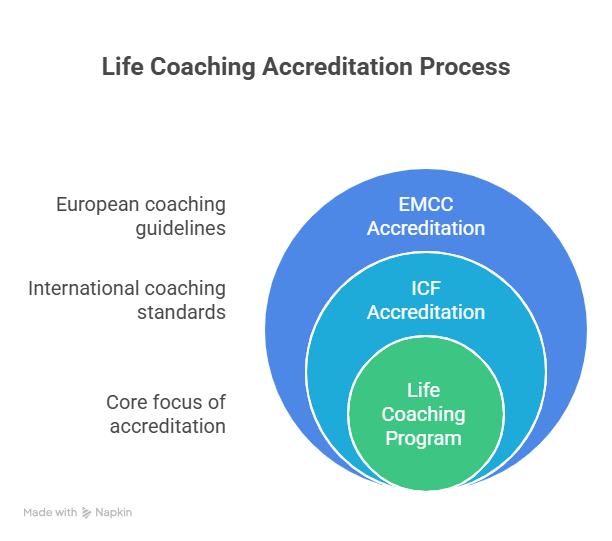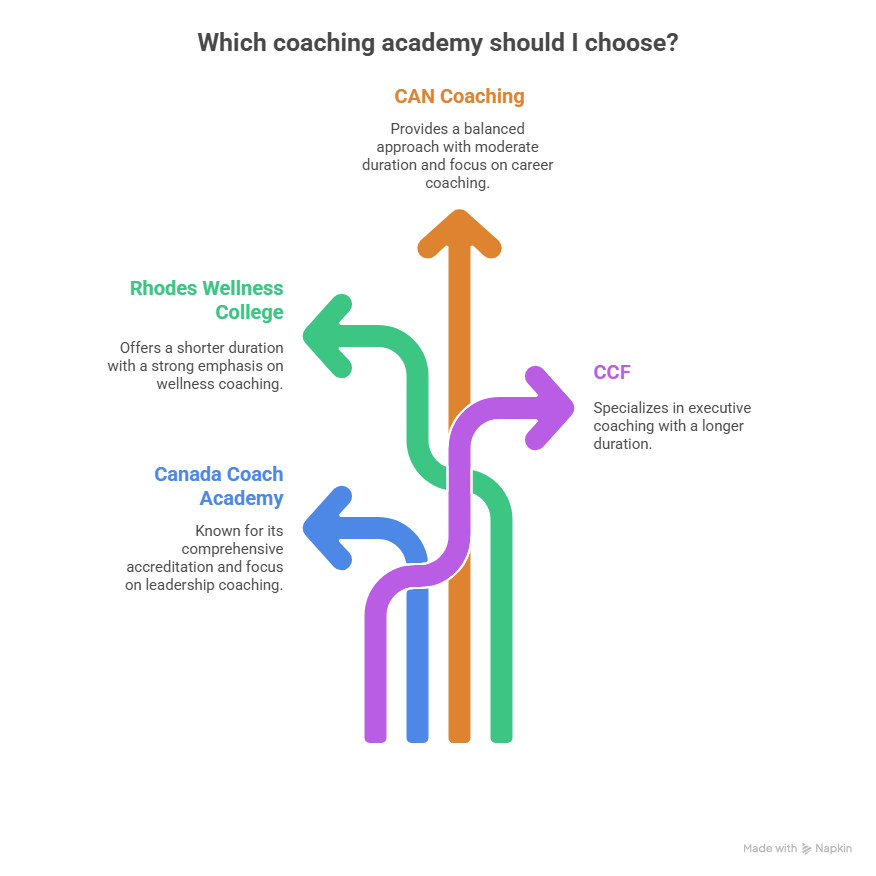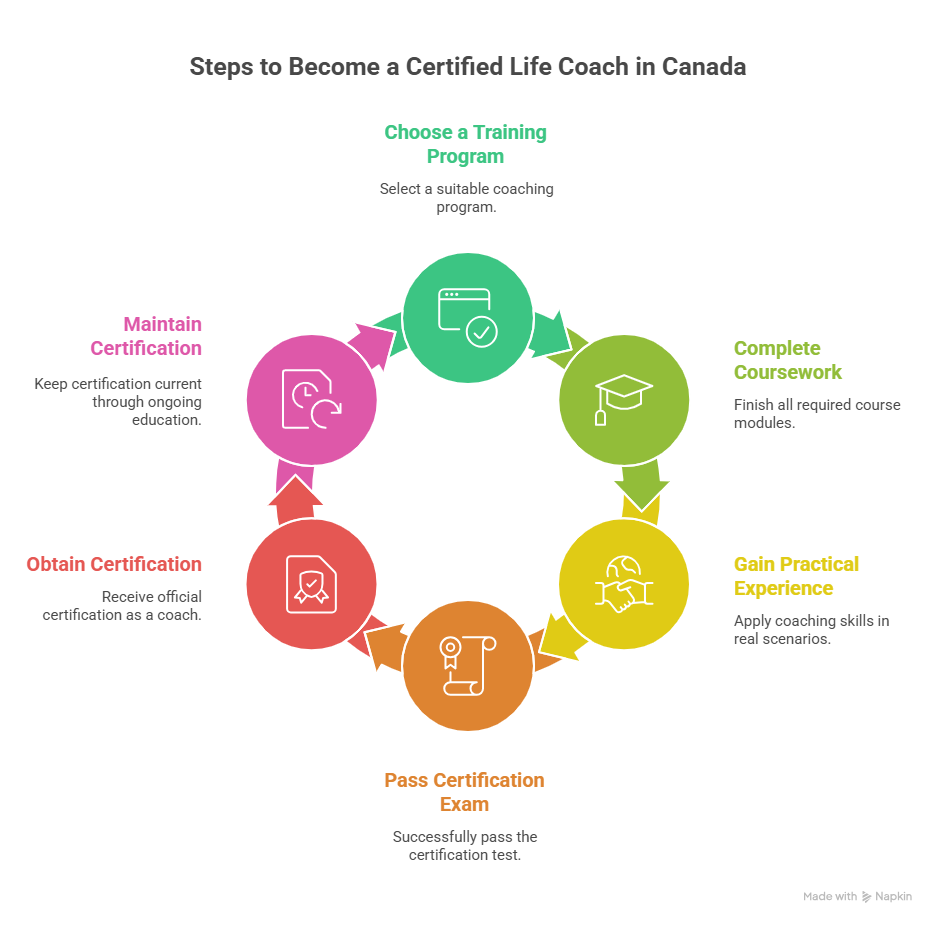If you want to become a professional life coach in Canada, earning a certification from a recognized and accredited institution is the best way to build credibility and attract clients. The best life coaching certifications in Canada are those accredited by international organizations like the International Coaching Federation (ICF) and offer hands-on mentoring, real-world practice, and ongoing career support.
This guide explores the most reputable programs, what to look for, and how to choose the right path for your coaching career.
Life coaching is one of the fastest-growing professions in Canada. Whether you want to help others achieve personal growth, career success, or emotional well-being, becoming a certified life coach gives you the tools to make a real difference.
Unlike therapy or counselling, life coaching focuses on goal achievement, motivation, and self-empowerment. However, Canada does not legally regulate the coaching profession, which means anyone can call themselves a coach. That’s why earning certification from a credible organization matters; it builds trust, professionalism, and confidence in your practice.
This article breaks down the top accredited programs, essential selection criteria, and steps to get certified as a life coach in Canada.
Key Takeaways
- The best life coaching certifications in Canada combine ICF accreditation, real-world practice, and strong mentorship.
- Programs like Canada Coach Academy, Rhodes Wellness College, and Centre for Applied Neuroscience are highly reputable.
- Certification boosts your credibility, confidence, and client trust, the three pillars of a thriving coaching business.
Key Criteria for Evaluating a Life Coaching Certification

When choosing a life coaching certification, focus on these five essential factors:
- Accreditation: Look for programs approved by reputable bodies such as the ICF (International Coaching Federation) or the EMCC (European Mentoring & Coaching Council). These ensure global recognition and ethical standards.
- Training Hours: Quality programs usually offer 60–125+ hours of training, including mentor coaching and supervised practice.
- Curriculum Depth: A good course covers coaching models, communication, emotional intelligence, ethics, and goal-setting frameworks.
- Delivery Format: Choose between online, in-person, or hybrid learning to match your schedule and lifestyle.
- Support & Community: Check for alumni networks, career support, and ongoing mentorship after graduation.
Top Life Coaching Certification Programs in Canada
Canada has several highly respected life coaching certification programs, such as Canada Coach Academy (ICF-accredited), Rhodes Wellness College, Centre for Applied Neuroscience, and Certified Coaches Federation. Each program offers its own unique strengths, some focus on wellness and emotional intelligence, others on neuroscience or fast-track business application. The best choice depends on your coaching niche, learning preferences, and long-term goals.

Canada Coach Academy
- Accreditation: ICF Accredited Coach Training Program (ACTP
- Highlights: Combines theory, live practice, and mentor coaching. Offers both Life and Wellness Coach certifications.
- Format: 100% virtual, ideal for working professionals.
- Why It Stands Out: Flexible schedules and small-group mentoring make it ideal for new coaches building confidence.
Rhodes Wellness College (Vancouver, BC)
- Accreditation: ICF-aligned and PTIB-approved.
- Highlights: Integrates life coaching with personal development, counselling techniques, and wellness practices
- Format: In-person or online hybrid options available.
- Why It Stands Out: Emphasis on emotional intelligence and self-awareness alongside coaching skills.
Centre for Applied Neuroscience (CAN Coaching)
- Accreditation: Recognized Canadian program focused on neuroscience-based coaching.
- Highlights: Blends psychology, brain science, and coaching methodology.
- Format: Online learning with practical sessions and certification exam
- Why It Stands Out: Ideal for coaches interested in the science of mindset and behavior change.
Certified Coaches Federation (CCF)
- Accreditation: Nationally recognized with international reach.
- Highlights: Offers fast-track certifications in Life Coaching, Executive Coaching, and Mindset Coaching.
- Format: 2-day intensive workshops (online or in-person).
- Why It Stands Out: Perfect for entrepreneurs seeking a quick, reputable certification to start coaching clients immediately.
How to Choose What’s Best for You
Choosing the best certification depends on your goals and lifestyle.
- If you want international recognition, go for an ICF-accredited program like Canada Coach Academy.
- If your focus is holistic wellness, choose Rhodes Wellness College.
- If you’re interested in mindset science, explore the Centre for Applied Neuroscience.
- If you want a quick business-oriented start, the Certified Coaches Federation is a strong choice.
Talk to alumni, attend info sessions, and compare schedules and tuition before enrolling.
Steps to Get Certified as a Life Coach in Canada
Becoming a certified life coach in Canada is a rewarding journey that blends personal growth with professional credibility. The process goes beyond learning coaching techniques; it’s about mastering communication, empathy, and transformation. By following these key steps, you can earn a recognized certification and build a fulfilling career helping others reach their potential.

Research and Select an Accredited Program
Start by exploring ICF-accredited or reputable Canadian programs that match your interests, goals, and availability. Accreditation ensures that the training meets global standards of coaching ethics, skill development, and practical application. Review course content, mentor support, learning style (online or in-person), and alumni success before committing.
Enroll and Complete Coursework
Most life coach training programs require 60–125+ hours of coursework. You’ll study communication skills, emotional intelligence, ethics, goal setting, and transformational coaching techniques. Many programs also include supervised practice sessions, where you’ll apply theories in real-life scenarios.
Participate in Mentor Coaching & Practicum
Mentor coaching allows you to learn directly from experienced, certified coaches. You’ll receive personalized feedback on your sessions and gain confidence in handling different client situations. The practicum component gives you hands-on experience coaching real clients under supervision.
Pass Assessments or Final Evaluations
After completing your coursework, you’ll undergo an assessment to demonstrate your coaching competency. This may involve written exams, recorded coaching sessions, or live evaluations to ensure you meet professional standards.
Apply for a Credential
Once you’ve met the training and experience requirements, you can apply for credentials like the ICF Associate Certified Coach (ACC) or Professional Certified Coach (PCC), depending on your experience level.
Continue Your Education
Coaching is a lifelong learning journey. Attend workshops, advanced courses, and supervision sessions to keep your certification active and your skills current.
By following these steps, you’ll establish yourself as a credible, ethical, and results-driven life coach ready to guide clients toward meaningful transformation.
FAQs
1. Is certification required to become a life coach in Canada?
No. However, certification provides credibility, professional ethics, and a competitive edge in attracting clients.
2. What’s the best recognized certification?
The ICF-accredited certification is considered the international gold standard for professional coaches.
3. How long does certification take?
Depending on the program, it can take 2 days to 12 months, depending on training hours and pace.
4. What does a life coaching certification cost in Canada?
Programs typically range from $2,000 to $8,000 CAD, depending on duration and accreditation.
5. Can I complete a certification online?
Yes. Many accredited programs offer virtual or hybrid formats that are equally valid as in-person training.
Conclusion

Choosing the best life coaching certification in Canada depends on your goals, learning style, and career vision. Whether you pursue an ICF-accredited program or a neuroscience-based certification, prioritize training depth, mentorship quality, and practical experience.
Certification is your foundation but true success as a coach comes from continuous learning, genuine empathy, and a commitment to transforming lives.





